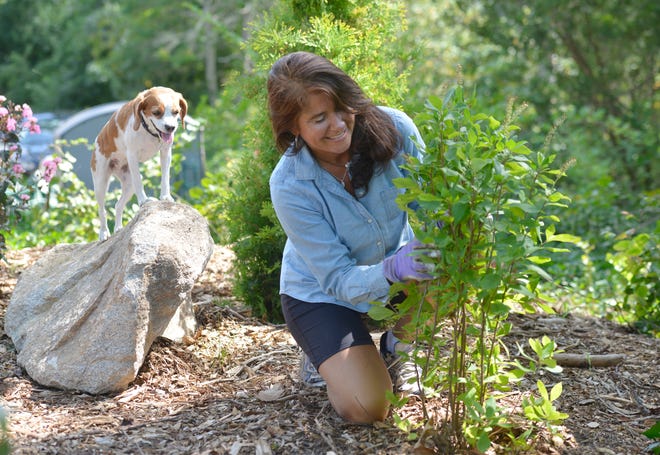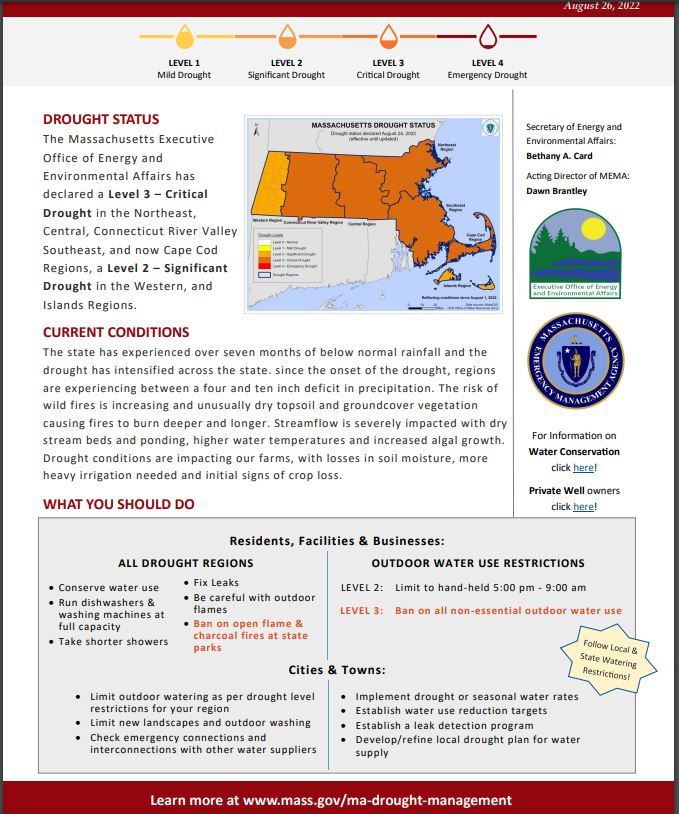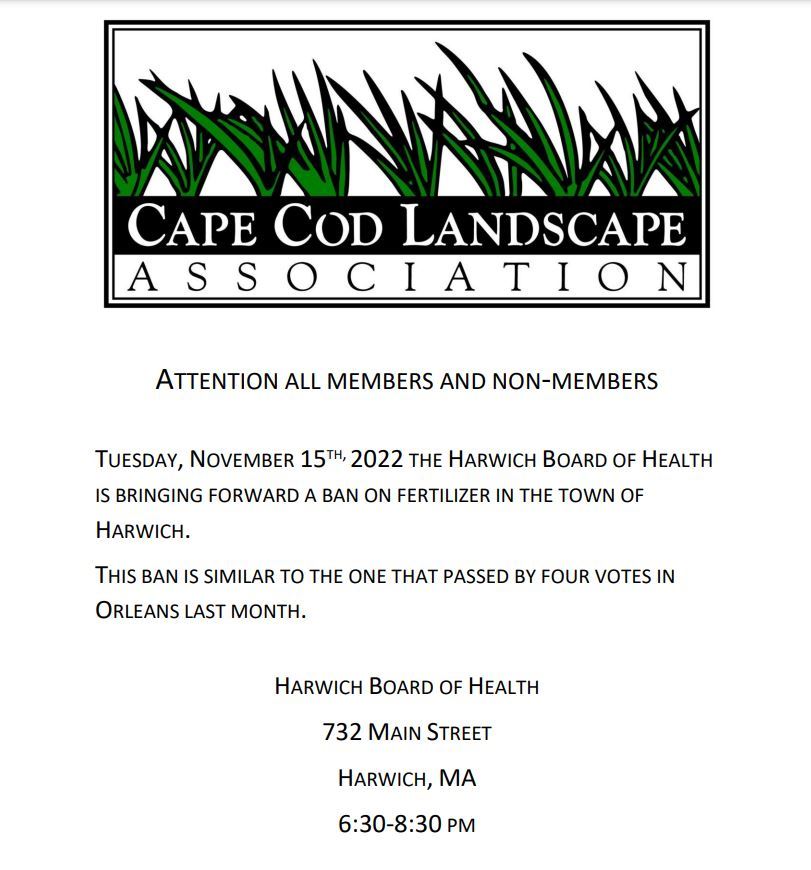Orleans will take its plan to prohibit fertilizer to town meeting votersCape Cod Times ORLEANS — The Select Board plans to petition the state legislature for a town-specific rule that will prohibit the application of fertilizer anywhere in town except on a farm. If the legislature and voters agree, Orleans would be the first town on Cape Cod to prohibit fertilizing. Nantucket is ahead in having filed similar legislation already. Adding nitrogen or phosphorus to Cape waters through runoff and groundwater after fertilizers are applied can lead to algal blooms limiting light penetration and consuming oxygen as the algae dies and decays. That can result in eutrophic conditions and even "dead zones" near the bottom and fish kills. Blue green algae, also known as cyanobacteria, may produce toxins in freshwater, severely limiting the use of those ponds.
“There are 63 ponds and 50 miles of coastline in Orleans," Select Board member Michael Herman said. "You can’t go anywhere without being near water. This is one of the most educated towns in Massachusetts. We know what we’re doing to the environment and we have to stop. The towns that protect their water will be the towns that thrive.” The town will hold a public hearing Wednesday on the proposal, during the Select Board meeting. The measure will come before a special town meeting Oct. 17. The proposed town meeting article would authorize the Select Board to petition the legislature specifically to prohibit the application of all fertilizers containing nitrogen or phosphorus, including organic or natural types. Herman was careful to point out the proposed bylaw is only a prohibition of application not a "ban." “You’ll still be allowed to sell it in Orleans because other people from other towns shop in Orleans,” he said. Orleans already has fertilizer controls which were adopted in 2013. The rules prohibit the application of nitrogen or phosphorus between Oct. 16 and April 14, or on driveways and sidewalks, prior to a heavy rainfall or to saturated soil. Application is prohibited within 100 feet of a resource area, such as a wetland. Phosphorus can be used on turf if tests show it is needed. But there are multiple exemptions, for agriculture, horticulture, vegetable gardens, trees, shrubs, flowers and establishing new vegetation. The exemptions essentially render the rules useless, Herman said. The proposed bylaw would prohibit fertilizer across the board. "All we’re doing is taking the 100 foot buffer law and extending it throughout town," Herman said. "Water travels more than 100 feet underground. We know it is not enough.” Why target fertilizer in Orleans?“Our waters keep degrading,” Herman said on a phone call. Studies prove fertilizer with excess nitrogen and phosphorus pollutes water, he said. "This is an extremely productive way to not pollute our waters but it’s not the only way. We have sewers and storm runoff,” said Herman, an organic farmer operating Greenhouse By The Sea and selling at the local farmers market. 'It's totally gone': Mashpee's water quality at an all-time low, report finds “We don’t use any fertilizer here and we have beautiful flowers and vegetables available,” he said. “You have to condition the soil with leaf compost. Things grow well without fertilizer. We’re using leaf compost because that would be natural to the property. It’s the balance of nature. Leaves are natural.” Fertilizer prohibition would work much faster that the town's sewer plan, Herman said. “The current town plan is to complete six phases, 62% of the town and it will cost hundreds of millions of dollars,” he said during the Aug. 22 workshop on the proposed bylaw. “We can make the most immediate impact if we stop using fertilizer. It saves you money it costs taxpayers and the town nothing and we can start right now.” Others agree that fertilizer elimination is inexpensive, easyThe Association to Preserve Cape Cod supports the proposed bylaw in Orleans to benefit both freshwater and salt water environments. “Our view is eliminating fertilizer is an extremely cost effective and easy technique people can do reduce stress on our resources. We’re supportive of Orleans efforts,” said Andrew Gottlieb, the executive director of the association, in a phone call. He hopes it’s just a start. “Ultimately we need a regional Cape-based solution,” Gottlieb said. “Doing it one town at a time won’t get us where we need to go. If enough towns tell legislators they want to do this I’m hopeful that will create the environment we hope to have.” The plan:Orleans Underground Mall redevelopment to include affordable housing Herman said Orleans has reached out to other towns, the Cape Cod Commission and Assembly of Delegates in an effort to make the prohibition Cape-wide but hasn’t heard back from everyone. Laura Kelley, founder of Littlefield Landscapes, is also a supporter of the Orleans proposal, even though she uses organic fertilizers on occasion because she specializes in organic land care. Kelley is also the founder of Protect Our Cape Cod Aquifer. “If we all cumulatively lessen nitrogen and phosphorus, homeowners and landscape businesses, we would be making a difference,” Kelley said in a phone call. “That’s why I’m on board. I will also shift my ways in response." Kelley uses Espoma, an organic brand of fertilizer. "That’s high in nitrogen and phosphorus," she said. "The alternative is leaf compost. There’s still nitrogen and phosphorus in leaf compost but there’s less. It’s how nature feeds itself. It’s what nature did before fertilizer and it's where we belong.” Orleans bylaw proposes a ban beyond lawns, but is it enforceable?Most home fertilizer is applied to lawns but the town is opting to prohibit it everywhere in the yard, Herman said. But will such a bylaw be enforceable? “We’re trying to make it enforceable,” Herman said. 
There were no penalties on any of the regulations in the book currently and anyone could still fertilize year-round with all the exemptions, he said. Because the proposal is a bylaw, 90% of people will stop doing it because it is the law, Herman predicted. "There’s always people who will find a way around it. That can be obvious with lawns, especially with the drought.” But the town would devote resources to enforce the new bylaw, if passed, he said. Proposed bylaw could take two years to be approved by legislatureThe legislative process, if town meeting voters approve the article, could take two years Herman said. For example, the special legislation sought by Orleans on the sewer betterment assessment formula is now in its third reading in the state Senate. That is after 20 months, and if the special legislation doesn’t make it out of committee by year’s end the process will have to start over. Cape Cod cyanobacteria report: 9 freshwater ponds on Cape Cod under watch or alerts The Orleans prohibition is modeled after one approved by Nantucket town meeting in May. That bylaw is also sitting in the legislature awaiting action. During a potential two-year wait for the proposed fertilizer bylaw to make it through the legislature, Orleans could refine its rules, Herman said, perhaps dealing with questions about store bought versus or homemade chicken manure, compost mixes, coffee grounds and such. The legislature could also change the wording. “What we want to do is be clear. Being clear is being kind. We want to make it so it works,” Herman said on the during the phone interview. “We are not stopping people from having lawns, gardens, flowers, vegetables. Vegetation has been around for 500 million years. Fertilizer has only been around for 100. In 2030, 2040 they’ll be thanking us. You have to be forward thinking. If it hurts our water we need to stop it.” Concerns about prohibiting fertilizersThe workshop held on Aug. 22 drew some people who believe the the idea of a complete prohibition went too far. Joshua Wile and his sister, Jessica Thomas, own Agway of Cape Cod and have a store in Orleans. “We’ve been in business in Orleans almost 30 years,” he said. “Protecting our waters has always been important to our family. Most of the issue is from septic systems. A small percentage of the entire issue is from fertilizer. The majority of the fertilize part comes from commercial applications. The homeowner purchasing fertilizer to apply themselves is only a small percentage of the problem." He argued that organic fertilizers are not nearly as damaging as synthetic ones. “I propose instead of taking that totally away from them why not educate the homeowner on using safer fertilizer or organic fertilizer,” Joshua said. Synthetic fertilizer is mostly water soluble so it can directly go into the water supply, he said. “Organic fertilizer is derived from once living organisms,” he said. “Organic nutrients are absorbed in the soil and they bind to the soil. The soil microbes break it down and make it accessible to the plant. It’s very very slow release. This greatly reduces runoff." Organic fertilizer doesn’t need to be applied nearly as often as synthetic fertilizer, Joshua said. Adding it to the soil improves soil structure and water retention, he said. Thomas also touted the virtue of organic fertilizers. “Healthy root systems are nature’s filters,” she said. “On Cape Cod basically living on a sand bank, building healthy soil and having healthy root systems is really important (to removing nutrients from groundwater). We have to do a little bit more to maintain our green spaces and to allow our plants whether a grass lawn or ornamental shrubs to thrive.” Thomas said Agway workers try to educate customers when to apply fertilizer and when not to, such as during a drought or when the grass is dormant. Tracy Murphy, chair of the Orleans Recreation Advisory Committee, representing perhaps the biggest users of manicured grass in town, said her committee was unanimously supportive. The committee uses manicured, maintained turf on athletic fields. ‘Protecting Orleans waters is a critical part of protecting health of our environment, wildlife residents visitors pets economy and property values,” Murphy said. Retired fisherman Bill Amaru looks to having neighborhood shellfish beds return with cleaner water. "Nitrogen and phosphorus in excess amounts whether introduced by cow plops or chemicals have the same impact on the environment and that’s a sad fact," Amaru said. “I want to go to the end of street and drag a scallop rake along the bottom and come home with enough scallops to feed my family,” he said. Is this the only way to go — prohibiting fertilizer? Orleans resident Scott Flood asked during the workshop. “What might other means be? What incentives could we put in place to get people to actually participate?” Flood said. 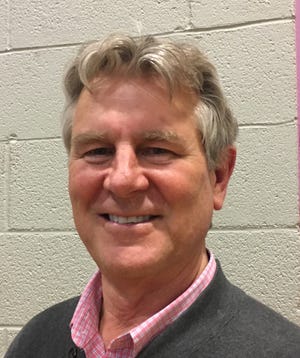
Select Board member Mark Mathison responded. “I hope we all understand that doing nothing is not an option,” Mathison said. Are there alternatives to fertilizer?If the town of Orleans does prohibit fertilizers one or two years hence, what can a homeowner do to maintain a lawn, grow tomatoes or celebrate with roses in June? Some local experts have ideas. “The real issue is turf,” Gottlieb, with the Association to Preserve Cape Cod, said. “As we work towards a regulatory solution hopefully we’ll find a way to accommodate vegetable gardening to feed everyone. If you allow clover in a grass mix you can have a very robust green space typical of the character of Cape Cod over the decades.” Several years ago the association promoted an alternative lawn mix, Colonial Seed, with a demonstration plot at a public garden in Brewster. “It had a good result. It was a no mow mix,” said Kristin Andres, the association's associate director of education and communication. 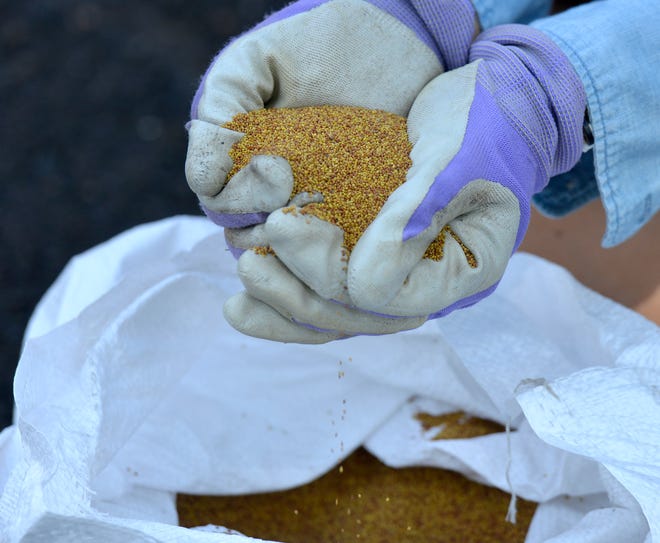
Andres said the Colonial Seed mix is still available at Agway. Another alternative ls a good old Cape Cod lawn, she said. "That’s what everybody had. Nobody had a turf lawn requiring chemicals. We’re trying to get back to the basics. With a Cape Cod lawn you can add clover, top dressing and reseeding,” Andres said. She suggested homeowners reduce their lawn area and plant more native plants to benefit insects. “A lot of native plants are drought tolerant,” Andres said. ‘This summer they’ve had an extreme challenge. A native plant is adapted to our soil and doesn’t need fertilizer or amendments." Kelley, the owner of a landscaping company, has been promoting alternative lawns for decades and she’s an advocate of leaf compost. “That way your land is fed continually like in nature,” Kelley said. “Consider the type of turf you are planting,” Jessica suggested. “There are so many types of turf available to the homeowner." |
From the 08/31/2022 issue of Cape Cod Times: Titled "Alternatives for Fertilizers for Your Lawn and Gardens" |
08/23/2022 WATER QUALITY AND CAPE COD'S ECONOMIC FUTURE: NITROGEN POLLUTION'S ECONOMIC IMPACT ON HOMES AND COMMUNITIES Mahesh Ramachandran, Ph.D. , Environmental Economist, Cape Cod Commission Opinion/Your Turn: Select board votes to ban fertilizer use. Will town meeting agree? Laura Kelley, Guest Columnist Did you hear the Orleans Select Board stepped up to make a difference to local waters? It voted unanimously on June 15 to prohibit the use of fertilizer in town. Regardless of being a homeowner or store owner, don’t we all want to protect our waters on Cape Cod? The Select Board in Orleans is following what Nantucket just did, they voted to write a Home Rule Petition: An Act prohibiting the application of fertilizer in Orleans, except on farms. The issue will now go before fall town meeting. There is sound scientific evidence proving that nitrogen and phosphorus in fertilizers are connected to the pollution of fresh and salt waters. When fertilizers are applied on land, much of it runs off from irrigation and rain causing the algae in ponds to grow more than usual, which causes harm to the health of ponds. This growth affects drinking water, shellfishing and even recreational swimming. I know we all love to swim in local ponds during hot months, and recently we’ve seen many ponds with signs up saying they are too unhealthy to swim in or allow dogs to drink from or to even fish in. This is due to excess bacteria growth — fueled by nitrogen and phosphorus — called cyanobacteria. Humans are negatively impacting the health of ponds with the use of fertilizers. We all can volunteer to not use fertilizer, taking one negative product out of the equation, right? That’s the simple way to help, then cumulatively we could make a big difference. A simple change in your land management plan is to add an inch of leaf compost in the spring on lawns and gardens instead of fertilizers. Granted there is still some nitrogen and phosphorus in leaf compost, but it is a much less, which decreases the nutrient load in sandy soil and seeping into waters we rely on. Remember, using animal compost has high amounts of nitrogen and phosphorus. We live here for the beauty that surrounds us. We cannot put one product above protecting the health of our water when we know the use of the product could be harmful. The responsibility of select boards throughout Cape Cod is to protect the economy and environment for us all. I hope other Cape Cod towns will follow the select boards of Orleans and Nantucket. On Oct. 17, 2022, the fertilizer prohibition will be an article at town meeting to be voted on by townspeople. We will see how that goes. Regardless, many people will see that their town board is trying to make a difference by removing fertilizer use. Laura Kelley, North Eastham |
Thousands of Cape Cod homeowners may need to replace septic systems under new state regulations - WBUR News
https://www.wbur.org/news/2022/11/28/cape-cod-septic-systems-new-state-title5-regulations

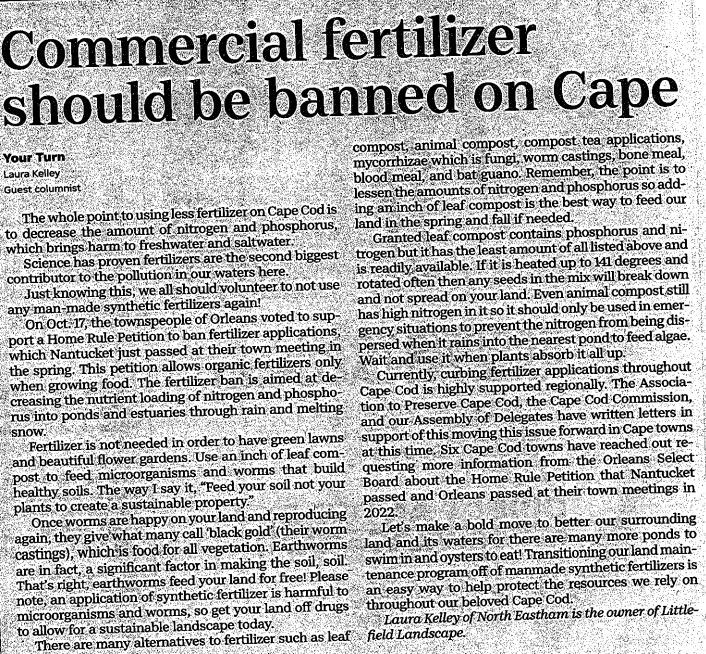
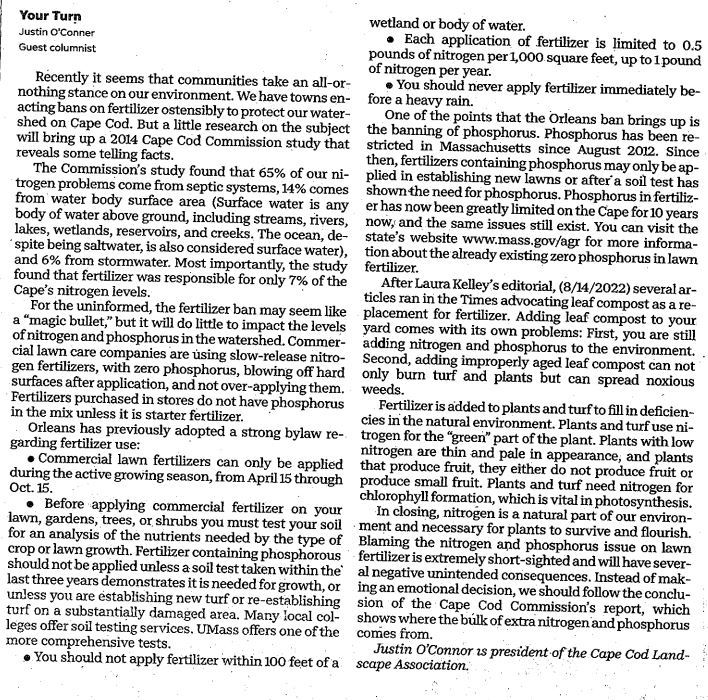


 Rich Eldred
Rich Eldred